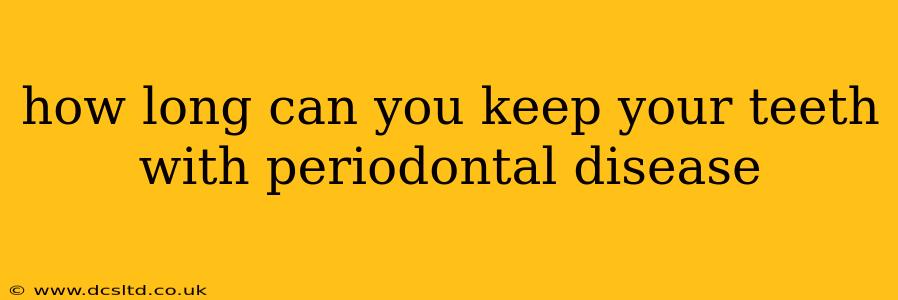Periodontal disease, also known as gum disease, is a serious infection that damages the soft tissues and bone that support your teeth. Untreated, it can lead to tooth loss. But the question of how long you can keep your teeth with periodontal disease is complex and depends on several crucial factors. There's no single answer, as the progression and severity vary greatly from person to person. Let's explore the key influences.
What Determines How Long You Can Keep Your Teeth with Periodontal Disease?
Several factors influence the progression of periodontal disease and the ultimate impact on your teeth:
-
Severity of the disease: Early stages of gingivitis (gum inflammation) are often reversible with improved oral hygiene. However, more advanced stages like periodontitis, which involves bone loss, require professional intervention and may lead to tooth loss if left untreated.
-
Individual response to treatment: Some individuals respond better to treatment than others. Factors like genetics, overall health, and adherence to the recommended treatment plan influence the success of therapies.
-
Commitment to oral hygiene: Maintaining meticulous oral hygiene, including regular brushing, flossing, and using mouthwash, is crucial in managing periodontal disease and slowing its progression. Neglecting oral hygiene significantly accelerates the disease's detrimental effects.
-
Regular dental checkups: Regular professional cleanings and checkups allow for early detection and treatment of periodontal disease, drastically increasing the chances of preserving your teeth. Early intervention is key to preventing irreversible damage.
How Does Periodontal Disease Lead to Tooth Loss?
Periodontal disease causes inflammation and infection of the gums and supporting bone structures. This leads to a breakdown of the tissues that hold teeth in place. As the disease progresses:
- Gum recession: The gums pull away from the teeth, exposing the roots and making them vulnerable to decay and infection.
- Bone loss: The bone that supports the teeth is gradually resorbed, weakening the tooth's anchorage.
- Pocket formation: Spaces (periodontal pockets) form between the teeth and gums, harboring bacteria and further fueling the infection.
- Tooth mobility: As the supporting structures deteriorate, teeth become loose and eventually fall out.
Can Periodontal Disease Be Reversed?
While advanced periodontitis cannot be completely reversed, its progression can be significantly slowed or stopped with proper treatment. This treatment often involves:
- Professional cleaning (scaling and root planing): Removes plaque and tartar from the teeth and root surfaces.
- Antibiotics: May be prescribed to combat bacterial infections.
- Surgery: In severe cases, surgical procedures may be necessary to regenerate bone and gum tissue.
What are the Treatment Options for Periodontal Disease?
Treatment options for periodontal disease range from conservative measures like improved oral hygiene and professional cleanings to more advanced procedures such as:
- Scaling and root planing: This deep cleaning procedure removes plaque and tartar from below the gum line.
- Antibiotic therapy: In some cases, antibiotics are used to control bacterial infections.
- Guided tissue regeneration: This surgical procedure encourages the regrowth of bone and gum tissue.
- Bone grafting: Bone grafting may be used to replace lost bone supporting the teeth.
- Flap surgery: This surgical procedure improves access to the deeper parts of the gum pocket for cleaning and treatment.
How Can I Prevent Periodontal Disease?
The best way to preserve your teeth and avoid the complications of periodontal disease is through prevention. This includes:
- Brushing twice daily: Use a soft-bristled toothbrush and fluoride toothpaste.
- Flossing daily: Remove plaque and food particles from between your teeth.
- Regular dental checkups: Visit your dentist at least twice a year for professional cleanings and examinations.
- Quit smoking: Smoking significantly increases the risk of periodontal disease.
- Maintain a healthy diet: A balanced diet contributes to overall health, including oral health.
In conclusion, the answer to "How long can you keep your teeth with periodontal disease?" depends on many factors. With early detection, proper treatment, and a commitment to oral hygiene, you can significantly increase your chances of keeping your teeth for life. Regular dental checkups are paramount in the fight against periodontal disease. Don't hesitate to seek professional help if you experience any symptoms of gum disease.
